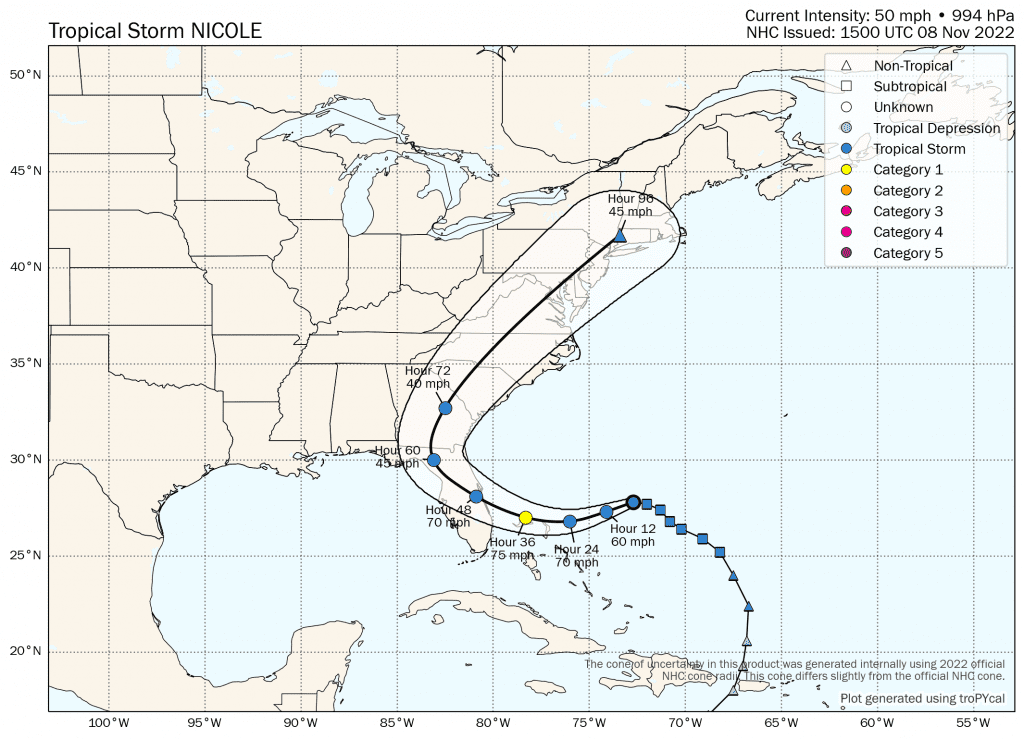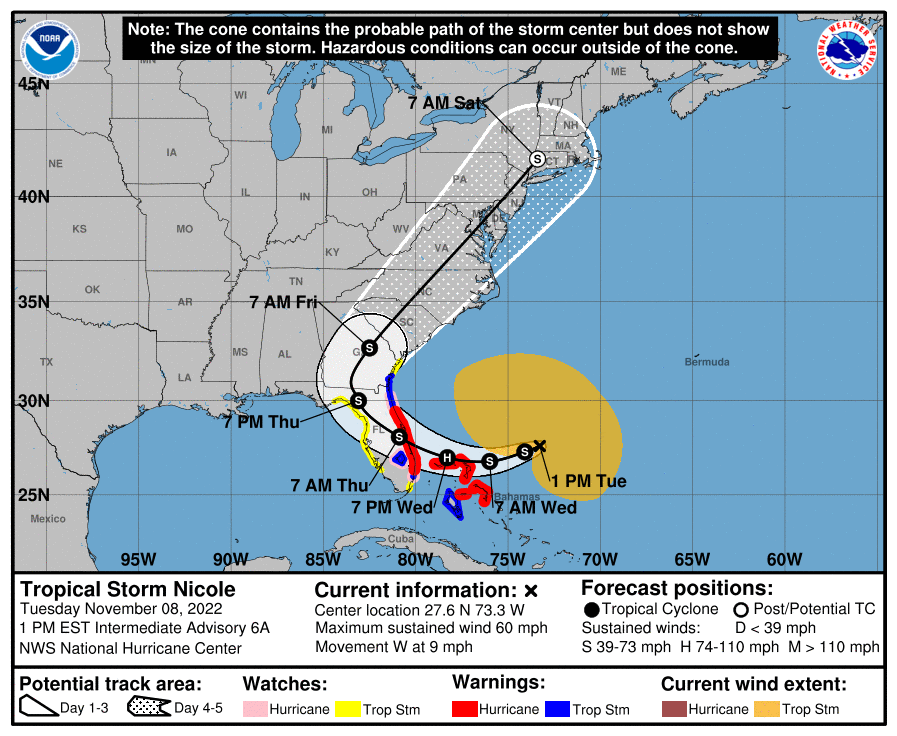Nicole now tropical & intensifying. Florida hurricane warnings raised

Tropical storm Nicole is intensifying, having expanded on approach to Florida’s east coast, while hurricane warnings have now been raised for Florida, with the NHC forecast suggesting the storm will become hurricane Nicole prior to making landfall.
A significant stretch of Florida’s eastern seaboard is now under various warnings, for hurricane, tropical storm and storm surge conditions.
Tropical storm Nicole has expanded significantly to carry a wind field that sees tropical storm force winds stretching some 610 km out from its center, while at the same time the central pressure is deepening somewhat, suggesting strengthening is set to begin.
Tropical storm Nicole has intensified and now has maximum sustained winds of around 60 mph with higher gusts as it tracks towards the northern Bahamas.
The minimum central pressure is estimated at 992mb, with hurricane models continuing to show a deeper storm, with lower central pressure, reaching Florida’s east coast, likely at Category 1 strength.
Given the significant wind field of tropical storm Nicole, a hurricane or tropical storm of that size can still cause significant impacts over a particularly wide area, even at a low category, hence insurance, reinsurance and ILS market interests will be watching how things develop over the next few days very closely.
The latest NHC updates states that “On the forecast track, the center of Nicole will approach the northwestern Bahamas today and tonight, move near or over those islands on Wednesday, and approach the east coast of Florida within the hurricane warning area Wednesday night. Nicole’s center is then expected to move across central and northern Florida into southern Georgia Thursday and Thursday night.”
As a tropical system, Nicole could now wrap up tighter and shrink the wind field a little. But still, this will be a very large storm, with wide-reaching effects likely to be felt across a significant area of the Florida peninsula as a result.
The latest forecast track and expected wind speeds can be seen on Tomer Burg’s excellent map below, which uses NHC data:
The NHC’s forecast cone can also be seen below. The latest update now shows hurricane Nicole forming a little further out towards the Bahamas, which could give more time for intensification as it approaches Florida:

As you can see, the forecast continues to call for hurricane Nicole to be named as this storm intensifies on approach to Florida’s east coast.
The NHC says that “Nicole is forecast to be near or at hurricane strength by Wednesday and Wednesday night while it is moving near the northwestern Bahamas and approaching the east coast of Florida.”
Storm surge peaks are still forecast to reach 3 ft to 5 ft along the Florida east coast from North Palm Beach to Altamaha Sound including the St. Johns River to the Fuller Warren Bridge, while the Bahamas could see surge peak at 6 foot.
Rainfall totals from the storm are forecast to reach as much as 7 inches, ample for significant flooding.
With Nicole now a tropical storm, if it intensifies, even just to a low wind-speed Category 1 hurricane Nicole, these storm surge forecast may increase a little, and also spread more widely along Florida’s coast, while rainfall storm totals could also rise.
The prospect of a low hurricane strength, with a tropical storm wind field extending more than 610 km out from its center, could threaten a much more impactful coastal and inland flood event, while also meaning strong and potentially damaging winds reach a relatively significant area of Florida.
Meteorologists continue to talk about the slow-moving nature of storm Nicole as well, which could pile water up against the Florida coast across more than one tide cycle, exacerbating the coastal flood effects.
Nicole remains a reminder that the tropics can throw storm events in the direction of Florida’s peninsula even in November, something the insurance and reinsurance industry has become far less used to in recent years.
You can track the 2022 Atlantic hurricane season on our dedicated page.






